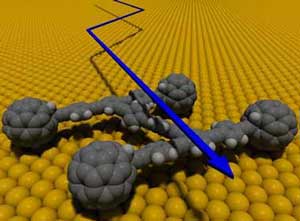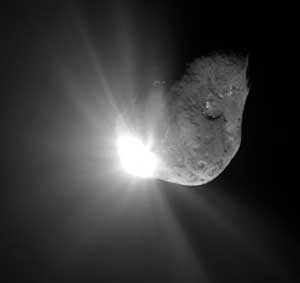Top scientific events in 2005
To reschedule, Livescience magazine introduced 10 top science stories in 2005, from nanotechnology, to decoding genes to protecting Earth civilization before asteroids .
1. In the nanotechnology world

In the nanotechnology world, engineers created tiny machines in 2005. Different research groups have created the world's smallest cars, robots, refrigerators and pens.
Their hope is that these machines, invisible to the naked eye, will one day be used to deliver drugs to cells to destroy cancer cells or cure diseases. In a new development, scientists have integrated bacteria with machinery for the first time, creating gilded bacteria that detect moisture.
2. The world is heating up
We can stop arguing about whether the climate is changing. There is a lot of evidence, from the narrowing of glaciers, the polar ice caps melting and the sea rising twice as much as the pre-industrial era. The way of migration and mating of animals is changing. 2005 is the hottest, driest and most stormy year. The big question is how much nature has caused this trend and how much greenhouse gas emissions contribute.
Meanwhile, a series of studies has made a dismal forecast: the temperature will continue to rise and the shorelines will be flooded in the next century. The world will also suffer stronger storms, more severe droughts, skyrocketing allergies, summer in the Arctic without ice . In response to this situation, more than 150 countries attended the Conference on behalf of Climate change is committed to solving this problem, but there is still no American involvement.
3. Self-defense of meteorites

Bombard Tempel
One day humans will have to deal with an asteroid or comet on their way to Earth. In the worst case scenario, they will destroy civilization or at least destroy a certain city. Big collisions have happened before and there will be many more. However, people do not know much about asteroids as well as their structure to plan deflection or destruction.
A major turning point occurred when NASA's Deep Impact spacecraft launched a copper bullet into Comet Tempel 1 on July 4. Meanwhile, a group of astronauts and scientists urged NASA to explore the Apophis asteroid - an object capable of colliding with the Earth for several decades. NASA's reaction: it is possible to launch an exploration ship, but we still have plenty of time to deflect Apophis if we look at it, and it will certainly hit Earth.
4. Signs of life on Mars
This story takes us back to 2004 and sounds like a mystery that will confuse scientists for years to come. In early 2005, European astronomers said the atmosphere on Mars seemed to have some methane. Perhaps this is the gas produced by bacteria living near the surface of the planet. Recently, they made this point stronger with new evidence of blocks of ice buried in areas with methane. Ice can provide valuable liquid water, needed to support organisms. However, other scientists argue that the argument is speculative.
5. Discovering the planet outside the solar system

Astronomers expect to find many planets the size of Earth, around other stars. However, the technology is currently unable to detect such small celestial bodies. Pushing back the limits of current methods, the researchers detected a planet with a mass of only 7.5 times the Earth, moving around a star. They think the planet is made of stone. 2005 marked 10 years since the discovery of the first planet outside the solar system. So far, astronomers have gathered enough data about about 150 planets.
6. Decode the software of life
2005 was a great year for gene decoding. Scientists have deciphered the chimpanzee's DNA, the closest relative of humans. Such research results are becoming so familiar that few people pay attention to the fact that the rice genome is also decoded. Now scientists are studying human DNA and they reveal identical twins are not exactly the same. Other researchers report that about 9% of human genes are rapidly evolving.
7. Aiming for immortality
Eccentric researcher Aubrey de Gray thinks it can stop old age. He also runs the Methuselah Mouse Prize. The purpose of this award is to promote advances in the longevity of mice, thereby slowing down the aging of humans. The prize fund has exceeded $ 1 million in 2005.
A scientific study has shown that the accumulation of mutant DNA causes aging in mice. Another study found that stimulating a certain gene in mice seems to be effective in delaying bone weakness, arterial obstruction, and muscle loss. Modern medicine is also helping people increase life expectancy. Ray Kurzweil, a computer scientist who plans to live a hundred years by drinking 250 types of supplements as well as drinking lots of alkaline water and green tea.
8. Recreate people
Scientists have made monkeys use thoughts to control a machine arm through a computer attached to the brain. Research has shown that monkeys considered this device as a natural body part. Meanwhile, the US military said it would prioritize the manufacture of artificial limbs. Other scientists are focusing on making electronic eyes . However, these studies have been overshadowed by the first facial transplant in the world, conducted in France.
9. The birth of black holes

In 2005, light from an explosion 2.2 billion years ago reached Earth. A series of ground and space telescopes have detected and monitored this light. Scientists suspect they have seen the birth of a black hole, just as it happened 2.2 billion years ago. The explosion occurs when two neutron stars merge.
10. Super storm becomes a reality

The busiest storm season in history has recorded the strongest storm in the Atlantic. Meanwhile scientists have provided the first solid evidence: Earth's warming is probably the agent of stronger storms. There are many strongest but most memorable and fearful storms still being Katrina. Katrina landed in the United States and devastated New Orleans. The power of nature has forced authorities and scientists to reevaluate human preparation for natural disasters.
Minh Son
- 10 most outstanding scientific events in 2016
- Famous mystical events in history
- 10 outstanding science and technology events 2014
- 10 scientific events in 2005
- The most notable scientific events in 2017
- 10 typical scientific and health events in 2005
- 10 outstanding scientific events in the world in 2018
- The 2011 event looks from the universe
- 2010 - Missed events
- Looking back at the outstanding scientific events in 2015
- 10 Vietnamese science and technology events in 2008
- 10 outstanding scientific and technological events in 2005
 Vietnam 5th Asian champion on fuel-efficient vehicles
Vietnam 5th Asian champion on fuel-efficient vehicles We can read all NASA studies completely free of charge
We can read all NASA studies completely free of charge Singer and songwriter Bob Dylan won the 2016 Nobel Prize for Literature
Singer and songwriter Bob Dylan won the 2016 Nobel Prize for Literature Scientific revolution in Asia
Scientific revolution in Asia What is the giant trace of a suspected spacecraft crash in Antarctica?
What is the giant trace of a suspected spacecraft crash in Antarctica?  Scientists plan to bring back the Dodo bird, but how exactly will they do it?
Scientists plan to bring back the Dodo bird, but how exactly will they do it?  NASA robot tripped over rock on Mars, did it detect an earthquake?
NASA robot tripped over rock on Mars, did it detect an earthquake?  Can animals heal themselves?
Can animals heal themselves?  19 Vietnamese scientists in the world rankings 2024
19 Vietnamese scientists in the world rankings 2024  How have animals evolved to become special?
How have animals evolved to become special? 